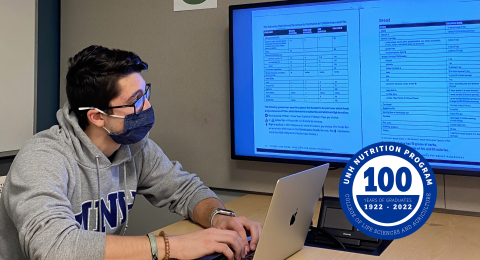Pursuing a degree in Nutritional Science at UNH will provide you with a comprehensive understanding of how food affects human health at a biochemical level. This major combines rigorous scientific study with practical applications, covering topics like metabolism, nutrient functions and the role of diet in disease prevention. This major appeals to students who are detail-oriented, science-driven and passionate about exploring the connections between diet and health and are interested in advancing public health, conducting research or working in clinical nutrition.
At UNH, you have three curriculum options (Dietetics, Health and Wellness, Nutritional Sciences) for pursuing a bachelor's degree in nutrition. Students typically declare an option within the nutrition major no later than the second semester of their sophomore year.
Read more about our Nutritional Sciences option below.
What is the study of nutritional sciences?
The nutritional sciences involve the study of biology, chemistry, physiology, nutrition, biochemistry and physics, as well as core courses in nutritional assessment, life cycle nutrition, nutrition and health and nutrition careers. Students completing the degree program are prepared for entry into professional schools of medicine, dentistry, nursing and physical therapy, graduate school, or technically oriented jobs in science.
Why study nutritional sciences at UNH?
Students in UNH’s nutritional sciences program not only benefit from a comprehensive curriculum, they also have opportunities to apply what they’re learning during internships and research in both clinical and non-clinical settings. Our highly engaged faculty are experts in the nutritional sciences field and provide individualized guidance tailored to each student’s goals, whether they plan to continue their formal education or enter the workforce following graduation. The program also offers the UNH-in-Italy program, which allows students to experience the medieval city of Ascoli Piceno while studying English-language courses that explore the links between food culture, sustainable agriculture and the policies and issues impacting the food system.
Potential careers
- Biotechnology
- Clinical nutrition
- Consulting and private practice
- Education
- Food and nutrition management
- Government
- Research
Curriculum & Requirements
Nutrition is the study of how nutrients and food components function at molecular, cellular, and whole-body levels to impact human health and disease. Students are grounded in fundamental sciences as they develop nutrition-specific competencies in nutrition and health, foods, nutritional assessment, wellness, life cycle nutrition, and/or metabolic biochemistry.
The nutrition program prepares students for entry-level positions in health care, education, research, or the biotechnology industry, or entry into post-baccalaureate professional programs. Nutrition faculty have expertise in clinical nutrition and food science, as well as assessing risk factors of chronic disease risk (i.e. obesity, diabetes, cardiovascular, cognitive) in diverse populations (pediatric, young adult, older adult), and populations that are underrepresented in research.
Students in the Nutritional Sciences option most often enroll in a post-graduate educational degree program (e.g., medical school, graduate school, physician assistant program, etc.) or enter the biomedical/biotechnology workplace.
Sample Degree Plan
This sample degree plan serves as a general guide; students collaborate with their academic advisor to develop a personalized degree plan to meet their academic goals and program requirements.
| First Year | ||
|---|---|---|
| Fall | Credits | |
| NUTR 400 | Nutrition in Health and Well Being | 4 |
| NUTR 401 | Professional Perspectives on Nutrition | 1 |
| ENGL 401 | First-Year Writing | 4 |
| BIOL 411 | Introductory Biology: Molecular and Cellular | 4 |
| CHEM 403 | General Chemistry I | 4 |
| Credits | 17 | |
| Spring | ||
| NUTR 476 | Nutritional Assessment | 4 |
| BIOL 412 | Introductory Biology: Evolution, Biodiversity and Ecology | 4 |
| CHEM 404 | General Chemistry II | 4 |
| MATH 424B | Calculus for Life Sciences | 4 |
| Credits | 16 | |
| Second Year | ||
| Fall | ||
| CHEM 545 & CHEM 546 | Organic Chemistry and Organic Chemistry Laboratory | 5 |
| BMS 507 | Human Anatomy and Physiology I | 4 |
| Select one of the following: | 4 | |
BIOL 528 | Applied Biostatistics I | |
PSYC 402 | Statistics in Psychology | |
SOC 402 | Statistics | |
HMP 540 | Statistics for Health and Human Service Professionals | |
| Discovery Course | 4 | |
| Credits | 17 | |
| Spring | ||
| BMS 503 & BMS 504 | General Microbiology and General Microbiology Laboratory | 5 |
| BMS 508 | Human Anatomy and Physiology II | 4 |
| SOC 400 or PSYC 401 | Introductory Sociology or Introduction to Psychology | 4 |
| Elective (any course) | 4 | |
| Credits | 17 | |
| Third Year | ||
| Fall | ||
| GEN 604 | Principles of Genetics | 4 |
| Nutrition Elective | 2-4 | |
| Discovery Course | 4 | |
| Elective (any course) | 4 | |
| Credits | 14-16 | |
| Spring | ||
| NUTR 650 | Life Cycle Nutrition | 4 |
| BMCB 658 & BMCB 659 | General Biochemistry and General Biochemistry Lab | 5 |
| Discovery Course | 4 | |
| Nutrition Elective | 2-4 | |
| Credits | 15-17 | |
| Fourth Year | ||
| Fall | ||
| NUTR 750 | Nutritional Biochemistry | 4 |
| Discovery Course | 4 | |
| Elective (any course) | 4 | |
| Elective (any course) | 4 | |
| Credits | 16 | |
| Spring | ||
| NUTR 751 | Nutritional Biochemistry of Micronutrients | 4 |
| 600 or 700-Level Elective Outside the Major | 4 | |
| Discovery Course | 4 | |
| Elective (any course) | 4 | |
| Credits | 16 | |
| Total Credits | 128-132 | |
Degree Requirements
All Major, Option and Elective Requirements as indicated.
*Major GPA requirements as indicated.
Major Requirements
A minimum grade of C- or above is required in all NUTR courses required by the major.
| Code | Title | Credits |
|---|---|---|
| Foundation Courses | ||
| BMS 507 | Human Anatomy and Physiology I | 4 |
| BMS 508 | Human Anatomy and Physiology II | 4 |
| SOC 400 | Introductory Sociology | 4 |
| or PSYC 401 | Introduction to Psychology | |
| Select one statistics course from the following: | 4 | |
BIOL 528 | Applied Biostatistics I | |
HMP 540 | Statistics for Health and Human Service Professionals | |
PSYC 402 | Statistics in Psychology | |
SOC 402 | Statistics | |
| Science Core Courses | ||
| BIOL 411 | Introductory Biology: Molecular and Cellular | 4 |
| BIOL 412 | Introductory Biology: Evolution, Biodiversity and Ecology | 4 |
| BMCB 658 & BMCB 659 | General Biochemistry and General Biochemistry Lab | 5 |
| BMS 503 & BMS 504 | General Microbiology and General Microbiology Laboratory | 5 |
| CHEM 403 | General Chemistry I | 4 |
| CHEM 404 | General Chemistry II | 4 |
| CHEM 545 & CHEM 546 | Organic Chemistry and Organic Chemistry Laboratory | 5 |
| GEN 604 | Principles of Genetics | 4 |
| Nutrition Core Courses | ||
| NUTR 400 | Nutrition in Health and Well Being | 4 |
| NUTR 401 | Professional Perspectives on Nutrition | 1 |
| NUTR 476 | Nutritional Assessment | 4 |
| NUTR 650 | Life Cycle Nutrition | 4 |
| Nutritional Sciences Option Courses | ||
| MATH 424B | Calculus for Life Sciences | 4 |
| NUTR 750 | Nutritional Biochemistry | 4 |
| NUTR 751 | Nutritional Biochemistry of Micronutrients | 4 |
| Major Elective Courses | ||
| Two nutrition Electives and a third Elective outside the major are chosen in consultation with the student's advisor, based on the student's career interests. | ||
| Select two NUTR courses (minimum 8 credits) | ||
| NUTR 403 | Culinary Arts Skills Development | 4 |
| NUTR 405 | Food and Society | 4 |
| NUTR 506 | Nutrition and Wellness | 4 |
| NUTR 525 | Food and Culture in Italy | 4 |
| NUTR 530 | Critical Analysis in Food Studies | 4 |
| NUTR 535 | History of Food in Italy | 4 |
| NUTR 546 | Nutrition in Exercise and Sports | 4 |
| NUTR 550 | Food Science: Principle and Practice | 4 |
| NUTR 560 | Introduction to Research in Nutrition | 2 |
| NUTR 595 | Mediterranean Diet and Culture | 4 |
| NUTR 600 | Field Experience in Nutrition | 1-4 |
| NUTR 610 | Nutrition Education and Counseling | 4 |
| NUTR 625 | From Farm to the Italian Table | 4 |
| NUTR 704 | Managerial Skills in Dietetics | 4 |
| NUTR 709 | Nutritional Epidemiology | 4 |
| NUTR 710 | Advanced Diabetes Care | 2 |
| NUTR 715 | Advanced Sports Nutrition | 4 |
| NUTR 720 | Community Nutrition | 4 |
| NUTR 730 | From Seed to Sea: Examining Sustainable Food Systems | 4 |
| NUTR 740 | Nutrition for Children with Special Needs | 4 |
| NUTR 755 & NUTR 758 | Concepts and Controversies in Weight Management and Practicum in Nutrition and Wellness | 5 |
| NUTR 773 | Clinical Nutrition | 4 |
| NUTR 775 | Practical Applications in Medical Nutrition Therapy | 4 |
| NUTR 780 | Critical Issues in Nutrition | 4 |
| NUTR 790 | Undergraduate Teaching Experience | 1-2 |
| NUTR 799H | Honors Senior Thesis | 1-8 |
| Select an additional elective outside the Major at 600- or 700-Level | 4 | |
Nutritional Science Capstone Experience
One capstone experience, supervised and approved within the major, is required of all seniors. The capstone explores areas of interest based on the integration of prior learning. The capstone requirement for Nutritional Sciences students is satisfied through the completion of NUTR 720 Community Nutrition or NUTR 751 Nutritional Biochemistry of Micronutrients.
NUTR 751 is a required course; and will only fulfill the university's capstone requirement if taken during the student's senior year.
Program Learning Outcomes
Students will be able to:
- Locate, interpret, evaluate and use professional literature to make ethical, evidence-based conclusions and decisions.
- Apply critical thinking skills.
- Deliver effective and professional oral and written communication.
- Demonstrate cultural humility, awareness of personal biases and an understanding of cultural difference they contribute to diversity, equity, and inclusion.
- Articulate the nutritional requirements for various populations across the lifespan.
- Explain macronutrient and micronutrient metabolism.
- Demonstrate an understanding of the scientific method and how it is used to generate knowledge in nutrition science.
Explore Program Details
Initial Admission to the major as a First-year or Transfer Student
Students entering the University as first-year or transfer students may declare Nutrition as part of the UNH admission process. First-year and transfer students who are admitted directly into Nutrition will be assigned an academic faculty advisor who will work with you throughout your course of study.
Change of Major Requirements for Existing UNH Students
We welcome UNH students who wish to declare the Nutrition Major or change their major from other degree programs. Applications are reviewed on a rolling basis; see below for entry requirements.
What Are the Steps to CHANGE My Major?
To facilitate a change of major into Nutrition, students should complete two steps*:
1) Submit an application requesting the transfer from another degree program. This online application is then reviewed by the program coordinator. Students are assigned an academic faculty advisor who will work with you throughout your course of study.
2) Request to change your major in Webcat. A tutorial for the process of changing a major is available.
ARE THERE REQUIREMENTS TO CHANGE MY MAJOR?
Current UNH students wishing to change their major and join the Nutrition Program must have:
- Earned a minimum of 12 UNH credits
- Completed OR be enrolled in NUTR 400 and NUTR 401
All students may transfer into one of the following:
- Nutrition: No Option
- Nutrition: Health & Wellness
- Nutrition: Nutritional Sciences
Students interested in transferring into the Nutrition: Dietetics Option, must also meet the following 3 requirements:
- Minimum GPA of 3.0
- Minimum earned grade in introductory nutrition (e.g. NUTR 400) = B
- Minimum earned grade in one semester of chemistry w/lab or anatomy/physiology with lab = C+
Students admitted to the Nutrition major at UNH are required to declare, and be formally admitted into, one of the following options:
Nutrition majors designate an option once they have successfully completed: 1) NUTR 400, 2) NUTR 401, & 3) BMS 507 or CHEM 403 (CHEM 411 for Wellness). The Fall and Spring semester deadlines are September 15th and February 15th, respectively.
CHANAS is a wonderful venue for those interested in undergraduate and graduate research projects. Each semester UNH students work as research assistants for the project and, in the process, gain valuable research and clinical skills.
Advising is available for UNH students, alumni, and post baccalaureates pursuing health professional careers.
The Pre-Health Advising Office provides support throughout the process of preparing for health professions school from advising on the courses they should take to helping navigate through the complex steps of the application process.
Register with Pre-Professional Health Office
Students interested in the Nutrition: Nutritional Science major may also be interested in the following advanced degrees at UNH. Students in the program also have the opportunity to participate in the UNH accelerated master’s program.
Agricultural Sciences M.S.
Agricultural Sciences Ph.D.
Nutrition M.S.
Nutrition and Dietetics M.S.
Nutritional Sciences M.S.
Nutritional Sciences Ph.D.

















